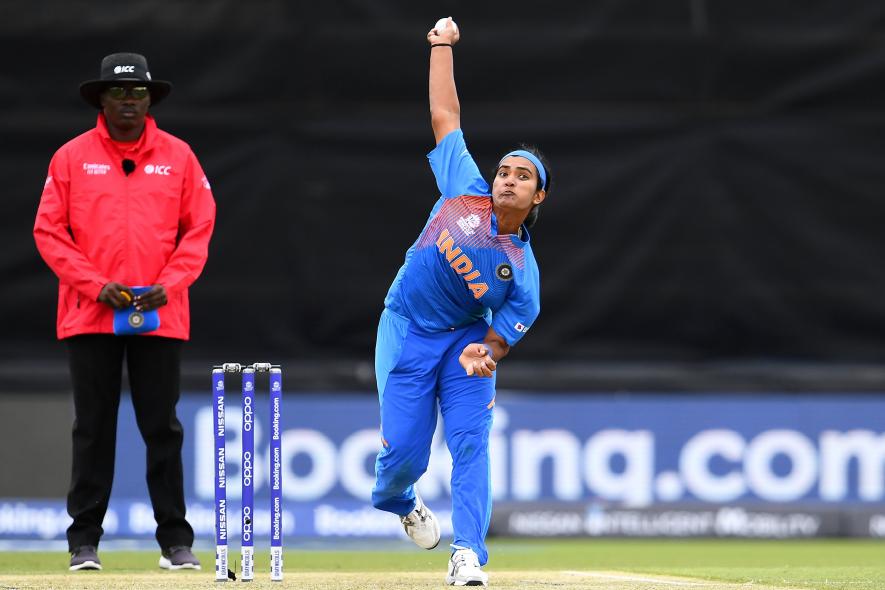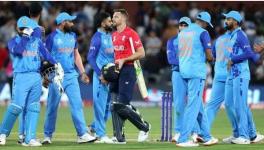Lockdown Tales From Cricket: Shikha Pandey Looks At the Bigger Picture

It seems strange and far away now, but in February this year, India were in the final of the ICC Women’s T20 World Cup. Even though the final remains a match best forgotten, the team’s victories over top opposition were built on a model that has relied on youth and experience equally.
As important as Shafali Verma’s blitzes at the top of the batting order were Shikha Pandey’s bombs in the opening overs of the game. Verma’s style was youthful, exuberant entertainment, following the prototype laid in the shortest form over many years. At the other end, Pandey the Air Force officer tightly controlled India’s bowling unit (she would end up with seven wickets at the tournament) and turned India into a miserly defensive unit. Fast bowlers don’t do exuberance. For them entertainment lies in discipline.
That habit has helped her endure this time without access to the game as Pandey stays in constant touch with her support staff via email and WhatsApp to keep herself motivated and going.
Also Read | AIFF to Cap Foreign Players in I-League Clubs This year, to Implement 3+1 Rule
In conversation she sounds measured, more concerned by the larger picture than the immediate knockdown effects the pandemic will have on her late stage career and the women’s game as a whole.
Despite not making tough decisions about the men’s World T20 to be held later this year (the ICC has dithered on postponing the event and insisted that they will consult the Australian government before making any announcements) the International Cricket Council have wielded the chop on the women and the age group game. The qualifiers for the 2021 Women’s World Cup and the 2022 men's Under-19 World Cup have been indefinitely postponed. Even though this does not affect India, who qualified for the tournament by virtue of having enough points anyway, it does confirm that when push comes to shove, the women’s game is dispensable.
And yet, the way Pandey sees it, even in this they have a certain privilege. They are Indian cricketers, representing the richest board in the world. And then the larger picture. They are part of the elites of society, surviving the lockdown with an ease few can. “We need to realise that we are really blessed and privileged to be in the position we are in when compared to a lot of others who are struggling even to manage a meal,” she says.
Also Read | Women’s Sport In India Remains Positive About Its Future
“Of course I want to get practicing post-lockdown. Looking forward to it. As an athlete, not to be playing or practising in your sport of choice is difficult. It also hampers our preparation for next year’s World Cup… but that isn’t what we have to look at right now. Right now, we have to do all we can to fight the situations Covid-19 has forced us into.”
When and how sport returns is up for conjecture. From packed stadiums and blockbuster TV deals, to highly paid sponsorships and overpriced tickets, a new reality may be frugal. The BCCI isn’t shying away from proposing to play games without fans in the stadium. But sport without fans in attendance will look and feel very different. For Indian cricketers, the men, an empty stadium is a paradigm shift.
The women team’s concerns will be headed a different way. The England & Wales Cricket Board (ECB) have already admitted to the possibility of having to sacrifice their women’s team to help the men’s season and there is a strong possibility other boards are not too far behind. The women’s game is under funded in multiple nations, across the West Indies, South Africa, Pakistan and Bangladesh, and if cricket is to take an economic hit, the gap will only grow. Any gains made will be lost.
Watch Also| Let’s Talk: Right to Play and Invisible Genocide in USA
In India the problems arise at the lower levels. Pandey and her Indian teammates will be protected by the BCCI, whose coffers are filled enough to buy out a few more countries. The women team have been on an upward trajectory (profile and performance) and there is no indication this will stop. At the grassroots there may be problems anew.
Pandey, who grew up playing cricket in Goa understands that in huge parts of the country, facilities for grassroots sport for women are rare, with much work to be done to help.
“Athletes who come from rural parts of India find it difficult to utilise better facilities that someone in a city has access to such as. The social outlook towards girls taking up sport is also different,” she says. A lack of employment opportunities and few academies capable of providing training facilities deter even those genuinely talented and interested.
“I have been lucky and haven’t really had to face such challenges,” Pandey says. "Goa gave me opportunities - including that of representing the state team - I may not have got elsewhere. I owe this place a major part of my achievements."
Read More | Right To Play: The Unsuspecting Casualty of a Pandemic | Outside Edge
At 15, Pandey started playing leather-ball cricket and went on to become the first player affiliated with the state board to represent India. Months after entering the formal set-up, she caught the eye of former Mumbai player and selector Surekha Bhandare, then touring the state with her team.
It was after that cricket became something to pursue professionally. She juggled sport and college, spending her mornings doing gym sessions and course work, the afternoons travelling 12km to Mapusa, where she trained with former Goa cricketer and Sports Authority of Goa coach Nitin Vernekar.
The only girl at the boys' facility, Pandey, like many Indian sportswomen used the skewed ratio to improve her already incredible skills.. "Facing U-16 and U-19 boys honed my reaction time against pace bowling. I also picked up a few vital lessons on negotiating spin,” she says.
When she walked into the national team it was in the shadow of stalwart, legend and fast bowler extraordinaire Jhulan Goswami. Goswami became a mentor, a senior and a colleague. Pandey now shoulders those burdens in the national set up, as one of the more experienced players in the team. A few days after this interview, Pandey was being considered for nomination for the Arjuna Awards alongwith with teammate Deepti Sharma.
Read More | BCCI Initiates Four Stage Plan For Team India During Quarantine
As always though, an in built discipline forces her to think of the big picture. “Female athletes are making sure that by their performances they attract the attention that they have always deserved,” she says. “The next step is to inspire a next generation.”
The cricket team’s success over the past few years has been a paradigm shift for the game in the country. From being outliers, they are now household names. A huge amount has changed since Pandey entered the game. Sitting now, without on-field action to look forward to, Pandey has time to reflect. She points out how the crisis has shown the need to appreciate health workers and people on the frontlines, fighting the pandemic. As much as sport remains a part of the conversation, now and for the future, Pandey’s message is towards more holistic change.
“I want to see all of us to be a little more compassionate towards others.”
Get the latest reports & analysis with people's perspective on Protests, movements & deep analytical videos, discussions of the current affairs in your Telegram app. Subscribe to NewsClick's Telegram channel & get Real-Time updates on stories, as they get published on our website.
























